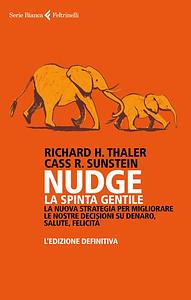Take a photo of a barcode or cover
If you've read other books on cognitive bias and the use of that bias to steer choices, this book isn't going to be particularly ground-breaking. The authors discuss the use of these biases in terms of "choice architecture" and "nudging," and they discuss at length whether it's appropriate to use these nudges and cues to help people or leave them with more freedom of choice. As the book goes on, they focus more and more on what they call libertarian paternalism, to the point where it started to feel like an annoying attempt to proselytize. They also would have been well-served to leave out the occasional mentions of politics, since their bias was rather obvious and, even ten years after publication, dated. All that said, if you haven't read much about cognitive bias, it's a good introduction to the topic and leaves the reader with more than a few instances of wondering why their common sense approaches aren't followed more widely.
informative
reflective
medium-paced
There are some really great methodologies presented in this book for helping steer people toward making more beneficial life decisions. This book captures some of the idealism of 2008, but because many of the choices presented involve government or market-based decisions, I believe many of the improvements suggested would face major political and special interest hurdles if attempted in our hyper-polarized society today.
Interesting book which puts forth the notiion of "libertarian paternalism." The authors recognize that there is a sensible middle ground between the liberal's notion of mandates and "big government" and the conservative's desires for free markets and absolutely no government involved. The book describes how "libertarian paternalism" can help, or nudge, a person to make choices that will be beneficial to himself or to society such as: eating healthier, investing wisely for retirement, choosing the right schools, improving the environment, etc. All without limiting choices. The authors save a chapter near the end to refute several arguments that are usually raised by critics of "libertarian paternalism" such is the slippery slope and ill intentioned nudgers. Well written and argued.
Good. Lots of psych terms. It's come up a few times at work too.
Paternalistic Libertarian. I have finally found a good description of my (current) political philosophy. Understanding the impact of choice architecture on human behavior is core to what government’s reach and responsibility ought to be.
When we don’t have a counterbalance to the self-serving choices presented by capitalism we end up with a nation of ill-informed, drug-dependent, in poor health denizens who under appreciate long term consequences and therefore make questionable decisions. And, those of us who are certain we are not influenced and biased by these choices are most vulnerable to this exploitation.
Read this book in conjunction with “Thinking, Fast and Slow” and “The Black Swan: The Impact Of The Highly Improbable” to get a broader view of the limitations and biases of our minds in how we make decisions.
In the end, though, it is each individual’s responsibility to make the final decision on what they are going to eat, whether to exercise or carry health insurance, how to invest for their future, etc. The government‘s responsibility is to provide clear understanding of the true costs of these decisions.
When we don’t have a counterbalance to the self-serving choices presented by capitalism we end up with a nation of ill-informed, drug-dependent, in poor health denizens who under appreciate long term consequences and therefore make questionable decisions. And, those of us who are certain we are not influenced and biased by these choices are most vulnerable to this exploitation.
Read this book in conjunction with “Thinking, Fast and Slow” and “The Black Swan: The Impact Of The Highly Improbable” to get a broader view of the limitations and biases of our minds in how we make decisions.
In the end, though, it is each individual’s responsibility to make the final decision on what they are going to eat, whether to exercise or carry health insurance, how to invest for their future, etc. The government‘s responsibility is to provide clear understanding of the true costs of these decisions.
Learned a lot around choice architecture and nudging.
As with all similar books, it's a mix of science and colorful examples. I was not that impressed at the beginning, but I liked the depth in the end + it made me really think about retirement and pensions and stuff, a topic which I really, really like to avoid. So props for that.
The basic concept of libertarian paternalism (retaining freedom of choice while still affecting average behaviour) is quite enticing, but some of the examples didn't really account for the burden that a risky choice would put on society later. They acknowledged this, but well, I still wouldn't let people waive their right to a safe working environment :D
I really liked the parts about default options, forced choices and "save more tomorrow", haven't come across anything similar before.
So I think Nudge it's worth a read.
“First, never underestimate the power of inertia. Second, that power can be harnessed.”
The basic concept of libertarian paternalism (retaining freedom of choice while still affecting average behaviour) is quite enticing, but some of the examples didn't really account for the burden that a risky choice would put on society later. They acknowledged this, but well, I still wouldn't let people waive their right to a safe working environment :D
I really liked the parts about default options, forced choices and "save more tomorrow", haven't come across anything similar before.
So I think Nudge it's worth a read.
“First, never underestimate the power of inertia. Second, that power can be harnessed.”
informative
medium-paced

